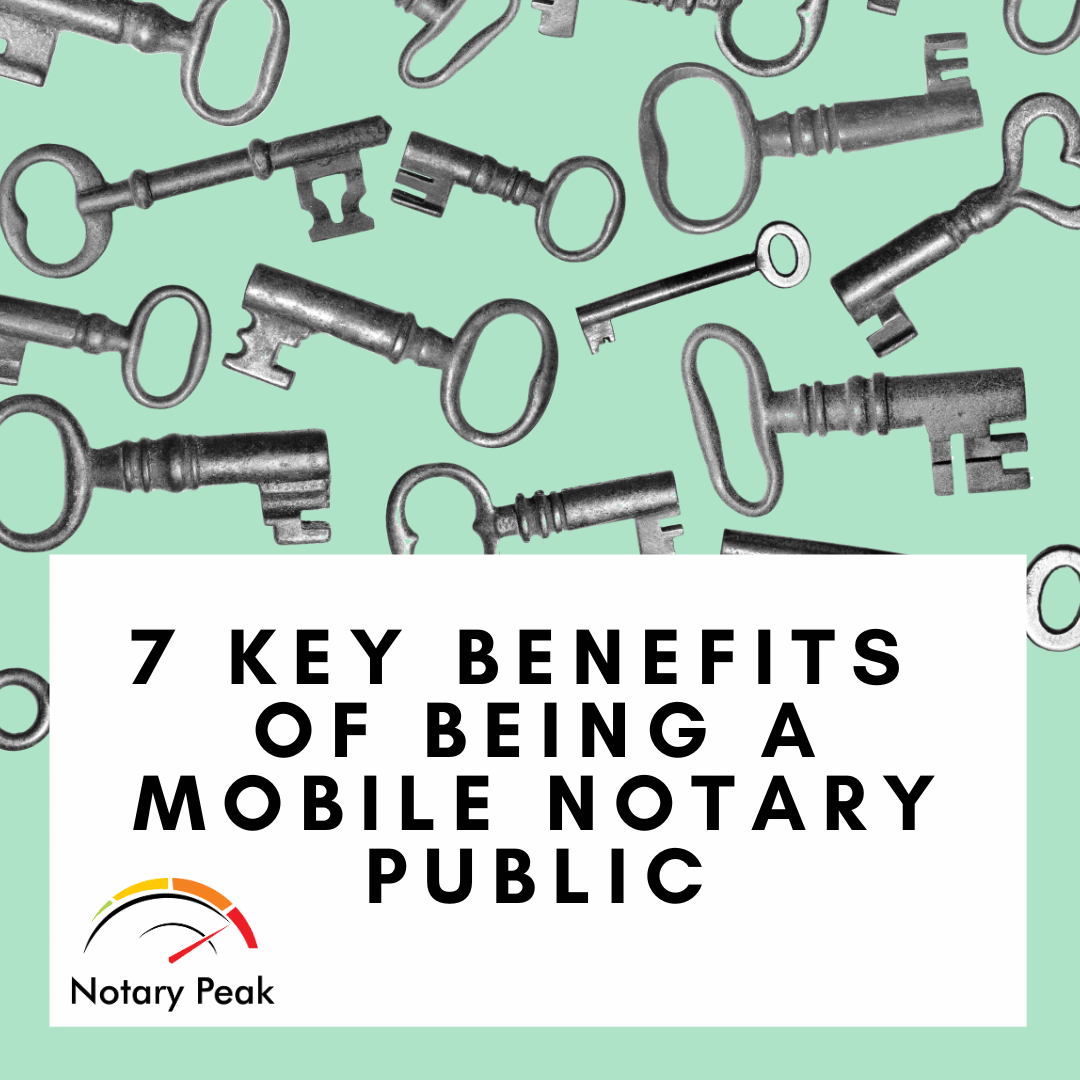If you want to know how to become a notary public in the state of Ohio, then this online guide will answer many of your questions.
Becoming a notary public can be an exciting new endeavor. Whether you are wanting to become a notary in Ohio because of your employment, or because you are wanting to provide Ohio notary services by starting your own notary business, you can find the answers you are looking for here.
In 2019, a new law went into effect. The Notary Modernization Act took effect in Ohio. This means that since then the application process for a new notary applicant as well as notary commission renewals, and remote online notarization authorization, will be submitted to and managed by the Ohio Secretary of State office.
You are no longer going to your county offices to apply or record your commission.
(This post may include affiliate links – read our disclosures)
Determine your eligibility for becoming a notary in Ohio.
To become a notary in Ohio the first requirement is that you must be a legal resident of Ohio, in good standing, or if you are a nonresident attorney with your primary practice in Ohio but are a nonresident, you can still become a notary for the state.
The next requirement after being an Ohio resident is to become a notary in Ohio you must be at least 18 years of age.
How to get commissioned as a notary public in Ohio.
- Get Your Background Check
The first step when becoming a notary in Ohio is to complete your criminal record checks (BCI Background Check). This must be submitted at the same time as your notary commission application. To get your criminal background check you will need to fill out a form and get your fingerprinting done at an authorized Bureau of Criminal Investigation location through Webcheck ®.
Here is a link for Webcheck ® locations in Ohio to get your fingerprinting done.
The BCI report will need to list a reason code to be sure that your search is done correctly. The reason code you need to use is 147022. Provide that number to the fingerprinting location at the time of your appointment.
If you are not in the state of Ohio when submitting your application, you can have your fingerprint cards (FD-258) done at any location that provides fingerprinting services and send them in.
Once you receive your BCI report (which may take up to 40 days) you will need to upload the report to the Secretary of State’s online system.

From Visually.
Offenses that disqualify you from becoming a notary public in the State of Ohio:
There are some criminal records that can disqualify you from becoming a notary in the state of Ohio. You must not have been convicted, plead guilty, or no contest to any offense that is considered disqualifying by section 9.79 in Ohio’s Revised Code.
Here is a link to Ohio’s Revised Code, section 9.79 to help determine if you might have a disqualifying offense. If you have some minor offenses and are unsure, It would be wise to review first before getting to far into the application process.
Section 9.79 – Ohio Revised Code
If you are unsure whether you may qualify to become a notary in Ohio or not, then your background check will determine that for you once you submit it with your application.
- Get your notary training.
New applicants required 3-hour education course that must be completed, as well as a test that you will need to pass. If you are not an attorney, and this is the first time that you have applied to become a notary public in Ohio, then you will need to go through the class at an authorized location.
Here is a link to the authorized education providers who can also give you the required test.
Education and Testing Information and Authorized Providers
As of the time this was written, the class and test fee for a non-attorney first time applicant is $130. The test is a 30-question multiple choice test with a time limit of 50 minutes.
- Complete a New Notary Commission Application
Once you have completed the above requirements then the next step is to submit your application to become a notary in Ohio. You can do this online at the Secretary of State’s website. There will be an application fee, which at the time this was written is $15.
While applying online you will also need to upload your education certificate, test score, and some other documents as well. So be prepared by having those documents already downloaded and saved so they are ready to upload.
The Ohio Secretary of State will not accept a background check older than 6 months, so be sure it is current. Again, if you aren’t sure if you have a disqualifying offense, it is best to get your background check done prior to paying for the required education and test.
Here is a link to fill out the notary application online:
Next Steps Once You Are Approved
Once you are approved you will receive your Notary Commission Certificate and your commission number. Keep this in a safe place. Now it’s time to get your notary supplies.
- Get a high-quality notary stamp.
- Get an efficient notary journal.
See our “3 Top Notary Public Journals Picks for Loan Signing Agents”.
Frequently Asked Questions:
1. What does it cost to become a notary public in the State of Ohio?
The cost for notary classes and testing is $130 and the state notary application fee is $15. So, it’s affordable to become a notary in the state of Ohio. If this is done for employment purposes, then your employer may cover the cost for you.
2. What is the contact information for the Ohio Secretary of State’s notary office?
The following information is the contact information for the state notary offices. Their website provides information and links on how to apply, get your training, as well as how to complete your background check.
Ohio Secretary of State – Notary
180 E. Broad St., 16th Floor, Columbus, OH 43215
Phone number: (614) 644-4459
3. How much can an Ohio notary charge for notary services?
As of the time this is being written an Ohio notary public can only charge $5 per notarized signature. However, a mobile notary may charge reasonable travel fees for an appointment. The only requirement regarding travel fees is that it must be disclosed and agreed to prior to the appointment.
A great way to do this is to put together a standard text that you send to the client prior to the notary appointment. Your text could include disclosures, travel fees, tips for a smooth appointment, and a requirement to reply “confirm” to the text.
4. How long is an Ohio notary commission good for?
The standard term for a notary public in the State of Ohio is for 5 years. After that it will need to be renewed if you plan on continuing to provide notary services. You may be able to submit a renewal application well before the expiration date of your commission, it is a good idea to check with the Secretary of State website for the renewal process.
If a notary is suspended for illegal behavior or because of poor notary practices, then your notary commission would obviously be revoked for disciplinary actions prior to the full term. You are required by Ohio law to notify the Secretary of State’s office if you are charged with any criminal offenses while commissioned as a notary public in Ohio.
5. Do I have to be a resident of Ohio to become a notary public for the state?
Ohio notaries are required to be at least 18 years old or older and must be a legal resident in the State of Ohio.
The only exception to this is if you are an attorney that is licensed to practice in the Ohio and have a main office within the state.
6. Are remote online notarizations allowed in Ohio?
If you are a commission notary public in the State of Ohio then you may be an online notary public and perform e-notarizations, also known as Remote Online Notarizations. This is a great way to get extra notary work without having to travel.
This will require additional authorization from the state as well as using an approved online platform.
Here is a link for the State of Ohio regulations regarding Remote Online Notarizations – Section 147.64 – Ohio Revised Code | Ohio Laws
7. Am I required to keep a notary journal as a notary in Ohio?
Electronic notarizations are the only notarial act that requires keeping a journal in the State of Ohio. The journal may be an electronic journal for online notarizations.
However, we still highly recommend that you keep a regular journal of your notarial acts as this will protect you in the instance of a lawsuit or protest of any notarization that you performed.
See our “3 Top Notary Public Journal Picks for Loan Signing Agents”.
Final Thoughts:
If you are looking to start your own notary business in the State of Ohio, then this can be an exciting time. Getting your notary commission is just the first step. You can also be a notary signing agent to perform real estate loan closings. We want you to take some time to look around our website and see all the resources that we provide.
See our article “How to Start Your Successful Mobile Notary Loan Signing Business”.
Serving your community as a notary public and having your own business is not only lucrative but provides vital services to your community. Once you are confident doing General Notary Work, you can help plenty of people that need your services.
People need documents notarized all the time. People with mobility issues, or are in the hospital, or are in a residential care facility. Busy people that are not available during normal business hours or can’t leave the office but need something notarized. Your notary services are vital in your community.
You may find that notary services in your community are in higher demand than you realized. With a good plan and proper execution, you can build a successful notary business doing real estate loan closings and general notary work.
See our article “3 Best General Notary Work Tips for Your Notary Business”.
You will find that there is a supportive online community of people that have started notary businesses and are eager to help you do the same. Notary Peak is one of those places! We aim to provide helpful resources and content for people that want to do just that.
The National Notary Association is also a great place to find a wealth of information on the subject of being a notary and running a notary business.
What is a Mobile Notary and What Do They Do?
In today’s fast-paced world, convenience and efficiency are highly valued. Whether it’s signing important documents, completing legal transactions, …
7 Best Pneumatic Adjustable Height Standing Desks
Elevate Your Workstation: What to Look for in a Pneumatic Adjustable Height Standing Desk In today’s fast-paced and …
7 Key Benefits of Being a Mobile Notary Public
Welcome to our insightful blog post where we delve into the world of mobile notary publics and uncover …
9 Best Desk Chairs for Small Home Office Spaces
In today’s rapidly evolving work landscape, the concept of the traditional office space has undergone a remarkable transformation. …
5 Simple Steps to Become a Mobile Notary Public
What is a Mobile Notary Public? A mobile notary public is a trained professional who provides notarial services …
How Much Money Can a Mobile Notary Signing Agent Make?
How much money that a Mobile Notary Signing Agent can make is really a variable that is determined …
7 Vital Notary Marketing Strategies for Your Business
Plan Your Notary Marketing Efforts – and Work Your Notary Marketing Plan Here is our Ultimate Marketing Guide …
7 Notary Business Startup Costs
Want to understand notary business startup costs and how to bootstrap your new notary business launch? All you …
99 Best Notary Business Name Ideas
Now it’s time to start working on a good business name for your notary business. This step-by-step guide …
5 Crucial Steps to Assess Your Notary Business Market
Assessing your notary business market is a crucial part of launching or re-launching your notary business. With proper …











